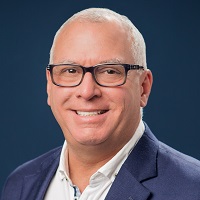Should Investors Worry About the Fed's Next Move?
Instead of trying to predict where interest rates are headed, you need to have a good investment plan and an open mind.

Profit and prosper with the best of Kiplinger's advice on investing, taxes, retirement, personal finance and much more. Delivered daily. Enter your email in the box and click Sign Me Up.
You are now subscribed
Your newsletter sign-up was successful
Want to add more newsletters?

Delivered daily
Kiplinger Today
Profit and prosper with the best of Kiplinger's advice on investing, taxes, retirement, personal finance and much more delivered daily. Smart money moves start here.

Sent five days a week
Kiplinger A Step Ahead
Get practical help to make better financial decisions in your everyday life, from spending to savings on top deals.

Delivered daily
Kiplinger Closing Bell
Get today's biggest financial and investing headlines delivered to your inbox every day the U.S. stock market is open.

Sent twice a week
Kiplinger Adviser Intel
Financial pros across the country share best practices and fresh tactics to preserve and grow your wealth.

Delivered weekly
Kiplinger Tax Tips
Trim your federal and state tax bills with practical tax-planning and tax-cutting strategies.

Sent twice a week
Kiplinger Retirement Tips
Your twice-a-week guide to planning and enjoying a financially secure and richly rewarding retirement

Sent bimonthly.
Kiplinger Adviser Angle
Insights for advisers, wealth managers and other financial professionals.

Sent twice a week
Kiplinger Investing Weekly
Your twice-a-week roundup of promising stocks, funds, companies and industries you should consider, ones you should avoid, and why.

Sent weekly for six weeks
Kiplinger Invest for Retirement
Your step-by-step six-part series on how to invest for retirement, from devising a successful strategy to exactly which investments to choose.
Trying to predict what consumers can expect from the Federal Reserve over the next five years is akin to peering into a cloudy crystal ball. No one really knows what the Fed might do—including the Fed—because world events constantly conspire to change the circumstances any decisions would be based on.
Here's what we do know, even without a high-functioning crystal ball: Everyone needs a good investment plan in place, no matter what the Fed's next move is.
Judging from everything going on with the economy and the stock market's volatility, I think it's safe to say the Fed has some real hesitancy about raising interest rates overall. We saw that when it failed to raise rates in June.
From just $107.88 $24.99 for Kiplinger Personal Finance
Become a smarter, better informed investor. Subscribe from just $107.88 $24.99, plus get up to 4 Special Issues

Sign up for Kiplinger’s Free Newsletters
Profit and prosper with the best of expert advice on investing, taxes, retirement, personal finance and more - straight to your e-mail.
Profit and prosper with the best of expert advice - straight to your e-mail.
And what's happening with U.S. markets is just one piece of the puzzle. Turmoil around the globe also plays into what the Fed decides. The Syrian refugee crisis, Greece's languishing economy and Brexit—the United Kingdom's surprise vote to exit the European Union—all play a role.
Brexit alone may have led to the Dow Jones industrial average plummeting 500 points one day in June. While it has mostly bounced back, the tech-heavy NASDAQ was down 3.3% in the first half of 2016.
The bottom line is that the world is interactive. Everything happening everywhere these days affects the U.S. market, which in turn affects Fed decisions.
Sadly, with interest rates at an all-time low for such a long time, it's difficult for anyone trying to save money to generate any kind of return without taking on more risk. Certainly, your money is nice and safe in a savings account or a CD, but the interest rates they pay are so small as to be practically nonexistent.
My advice? Keep an open mind about different tools that can help you generate income and cash flow. That might include high quality dividend-paying stocks, a solid fixed-rate annuity with an insurance company or, for a small percentage of your portfolio, income-producing real estate that's well diversified.
Even if the Fed does begin to raise rates, it's likely to be a process that limps along gingerly because of the world economic situation, with increases happening at just a quarter of a percentage point at a time.
But I'm convinced interest rates will indeed go up over the next five years, and I make that prediction not just because of some nifty crystal-ball gazing.
It's simply that up is just about the only direction available.
Bryan S. Slovon is founder and CEO of Stuart Financial Group, a boutique financial services firm exclusively serving retirees and soon-to-be retirees in the D.C. metro area. He is an Investment Adviser Representative and insurance professional.
Yvette Hammett contributed to this article.
Profit and prosper with the best of Kiplinger's advice on investing, taxes, retirement, personal finance and much more. Delivered daily. Enter your email in the box and click Sign Me Up.

Bryan S. Slovon is founder and CEO of Stuart Financial Group, a boutique financial services firm exclusively serving retirees and soon-to-be retirees in the D.C. metro area. He is an Investment Adviser Representative and insurance professional focusing on retirement planning and wealth preservation to a select group of clients. (Advisory services offered through J.W. Cole Advisors, Inc. (JWCA). Stuart Financial Group and JWCA are unaffiliated entities.)
-
 Dow Leads in Mixed Session on Amgen Earnings: Stock Market Today
Dow Leads in Mixed Session on Amgen Earnings: Stock Market TodayThe rest of Wall Street struggled as Advanced Micro Devices earnings caused a chip-stock sell-off.
-
 How to Watch the 2026 Winter Olympics Without Overpaying
How to Watch the 2026 Winter Olympics Without OverpayingHere’s how to stream the 2026 Winter Olympics live, including low-cost viewing options, Peacock access and ways to catch your favorite athletes and events from anywhere.
-
 Here’s How to Stream the Super Bowl for Less
Here’s How to Stream the Super Bowl for LessWe'll show you the least expensive ways to stream football's biggest event.
-
 How to Add a Pet Trust to Your Estate Plan: Don't Leave Your Best Friend to Chance
How to Add a Pet Trust to Your Estate Plan: Don't Leave Your Best Friend to ChanceAdding a pet trust to your estate plan can ensure your pets are properly looked after when you're no longer able to care for them. This is how to go about it.
-
 Want to Avoid Leaving Chaos in Your Wake? Don't Leave Behind an Outdated Estate Plan
Want to Avoid Leaving Chaos in Your Wake? Don't Leave Behind an Outdated Estate PlanAn outdated or incomplete estate plan could cause confusion for those handling your affairs at a difficult time. This guide highlights what to update and when.
-
 I'm a Financial Adviser: This Is Why I Became an Advocate for Fee-Only Financial Advice
I'm a Financial Adviser: This Is Why I Became an Advocate for Fee-Only Financial AdviceCan financial advisers who earn commissions on product sales give clients the best advice? For one professional, changing track was the clear choice.
-
 I Met With 100-Plus Advisers to Develop This Road Map for Adopting AI
I Met With 100-Plus Advisers to Develop This Road Map for Adopting AIFor financial advisers eager to embrace AI but unsure where to start, this road map will help you integrate the right tools and safeguards into your work.
-
 The Referral Revolution: How to Grow Your Business With Trust
The Referral Revolution: How to Grow Your Business With TrustYou can attract ideal clients by focusing on value and leveraging your current relationships to create a referral-based practice.
-
 This Is How You Can Land a Job You'll Love
This Is How You Can Land a Job You'll Love"Work How You Are Wired" leads job seekers on a journey of self-discovery that could help them snag the job of their dreams.
-
 65 or Older? Cut Your Tax Bill Before the Clock Runs Out
65 or Older? Cut Your Tax Bill Before the Clock Runs OutThanks to the OBBBA, you may be able to trim your tax bill by as much as $14,000. But you'll need to act soon, as not all of the provisions are permanent.
-
 The Key to a Successful Transition When Selling Your Business: Start the Process Sooner Than You Think You Need To
The Key to a Successful Transition When Selling Your Business: Start the Process Sooner Than You Think You Need ToWay before selling your business, you can align tax strategy, estate planning, family priorities and investment decisions to create flexibility.